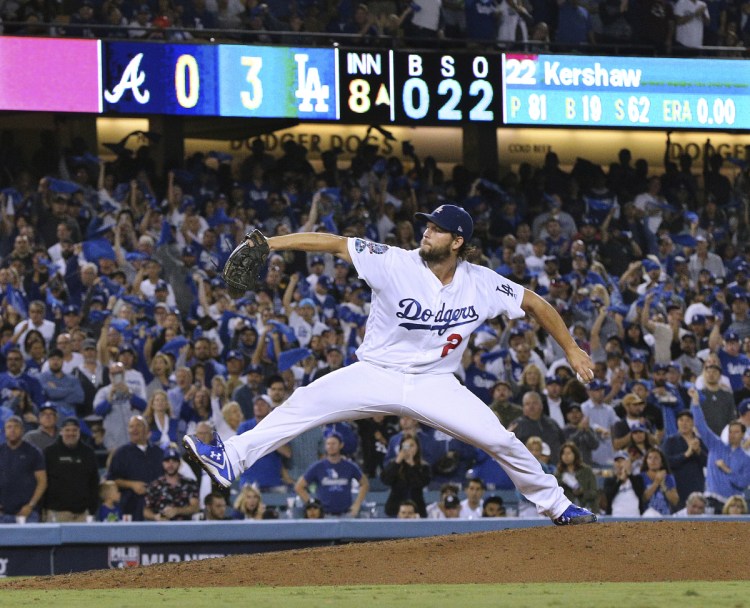LOS ANGELES — The Los Angeles Dodgers’ celebration at Atlanta’s SunTrust Park on Monday was as much about checking off a box as it was about what they had accomplished. They expected to advance to the National League Championship Series, to within four wins of another trip to the World Series.
The path this season was rockier than anticipated, but anything less would have been a colossal letdown.
The party the Milwaukee Brewers had at Coors Field in Denver a day earlier had a different flavor. The Brewers weren’t projected to reach the NLCS. They play in baseball’s smallest market, an afterthought in Chicago’s shadow, and have one of the majors’ slimmest payrolls. It was their first playoff series victory since 2011, the last time they were in the playoffs. They went to the NLCS that year and lost. They haven’t won a World Series or even been to one since 1982.
This is unfamiliar territory.
But the clubs will have at least one thing in common when they arrive at Milwaukee’s Miller Park for Game 1 on Friday: They’re both playing their best baseball. The Dodgers have won seven of their last eight games, outscoring opponents 47-15. The Brewers have been even better, winning 11 straight and breezing through the NL Division Series by outscoring the Colorado Rockies 13-2 in a three-game sweep.
“It’s going to be great,” Dodgers shortstop Manny Machado said. “Both ballclubs have worked hard to get to this situation..”
Presumptive NL MVP Christian Yelich anchors a deep Brewers lineup that features a little bit of everything. They’re traditional in that regard.
But pitching is another matter. The Brewers deploy their pitchers like most analytically driven clubs; they’d rather not let a pitcher face a lineup three times, regardless of pitch count, and they’re not afraid to shift a heavier onus onto their bullpen. But the Brewers have catapulted the revolution to another level.
Manager Craig Counsell would rather not label his pitchers “starters” or “relievers.” He prefers “out-getters.” In Game 1 against the Rockies, he ditched the traditional starter entirely, opting to start Brandon Woodruff, a reliever. Woodruff tossed three scoreless innings. Traditional starters Jhoulys Chacin and Wade Miley started the next two games but logged only 72/3 innings combined.
The strategy is effective because Milwaukee’s bullpen – headlined by Jeremy Jeffress, Josh Hader and Corey Knebel – is one of baseball’s best, and the postseason schedule, which affords more days off, renders the approach more viable. Jeffress, Hader and Knebel each appeared in all three NLDS wins. They gave up two runs and six hits with 12 strikeouts in 82/3 innings – and they’ll be fresh Friday after a four-day layoff.
Meanwhile, the Dodgers, realizing their strength lies elsewhere, are countering the sport’s current thinking. Hyun-Jin Ryu threw seven scoreless innings in Game 1 against the Atlanta Braves. Clayton Kershaw tossed eight scoreless innings in Game 2. Walker Buehler was given enough leash to push through a five-run second inning in Game 3 before settling in to log five innings, and Rich Hill was pulled in the fifth inning in Game 4 after issuing five walks.
A year after riding Kenley Jansen and a deep bullpen to Game 7 of the World Series, the Dodgers’ success is dependent on their starting rotation.
“Hyun-Jin (was) unbelievable,” Kershaw said. “And Walker, after he took his lump there in that one inning, came back and threw really well … . Yeah, we’ve got some depth there, which is huge.”
Kershaw will get the first crack Friday. It wasn’t an obvious choice, not after his bosses decided to start Ryu in Game 1 of the NLDS. It was the first time Kershaw didn’t start a Game 1 for the Dodgers when he was available since 2009. That order has been restored.
Copy the Story LinkSend questions/comments to the editors.



Success. Please wait for the page to reload. If the page does not reload within 5 seconds, please refresh the page.
Enter your email and password to access comments.
Hi, to comment on stories you must . This profile is in addition to your subscription and website login.
Already have a commenting profile? .
Invalid username/password.
Please check your email to confirm and complete your registration.
Only subscribers are eligible to post comments. Please subscribe or login first for digital access. Here’s why.
Use the form below to reset your password. When you've submitted your account email, we will send an email with a reset code.